In my opinion, a camper van is the ultimate traveling vehicle. So what is a camper van? As it turns out, a camper van can be quite a lot of things. Even a minivan!
In this ultimate camper van guide, we’re taking a look at every FAQ I could find about camper vans. Let’s dive in!
Ps: since this guide is so long, I’ve included a handy table of contents just below this paragraph. It should help you navigate to what you want to learn the fastest. Ok, let's go!
What Is a Camper Van?
A camper van is exactly what it sounds like: a van turned into a camper… that you can camp in.
But it’s not so simple: there are many different types of camper vans! The van life movement have made camper vans more popular than ever before.
There are Class B RV campervans, DIY van camper conversions, minivan campers, and more. Some people even call their converted Honda Elements “campervans”.
What’s The Difference Between a Camper Van and a Motor Home?
Some camper vans are technically considered motorhomes. In reality, all campervans, regardless of build, can be considered motorhomes.
But for the sake of this article, we will talk about three different kinds of campervans. They are class B RVs, DIY van conversions, and minivan campers.
Class B RVs are made by RV manufacturers, so these types of camper vans actually are motorhomes.

Download this FREE ebook learn 60+ ways to earn an income from anywhere!
Is a Camper Van Considered a Recreational Vehicle?
Yes, some are! But not all. Campervans that are built and sold by RV manufacturers are called Class B RVs, and some are considered Class B+ RVs.
Class B and Class B+ RVs are built by RV manufacturers in the same way that other RVs and motorhomes are produced. These campervans are sold and marketed as recreational vehicles.
Camper Van Types
Are you feeling confused about the different types of camper vans yet? Not to worry, I’ll break it down for you here and give some examples. It is definitely confusing hearing about so many different types and styles!
Class B RV Camper Vans
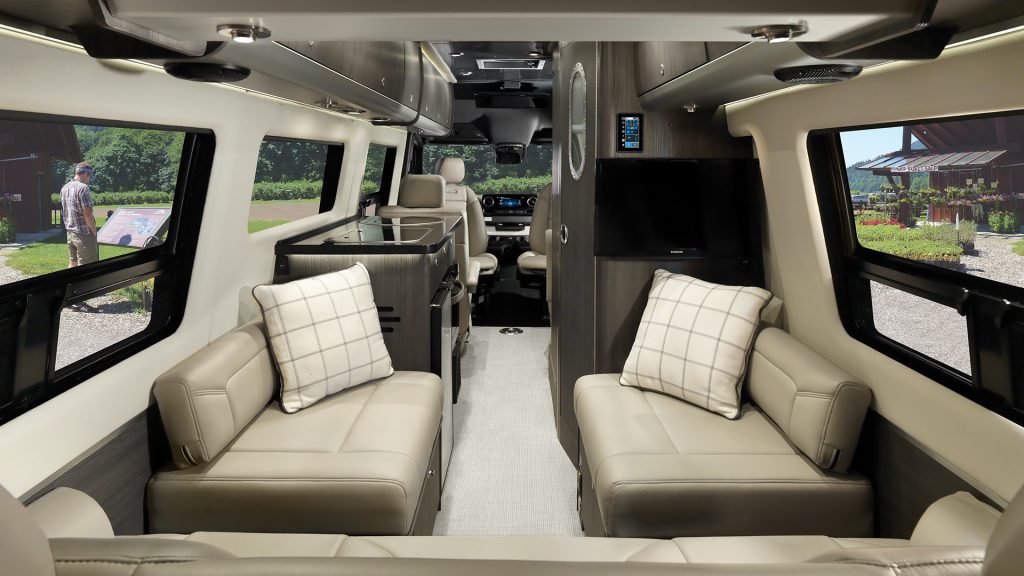
Airstream Interstate interior
Class B RVs are simply campervans that are built and sold by RV manufacturers. The manufacturer starts with a van body and builds out an entire RV inside of it. These professionally built RVs are incredibly expensive. But, they come with pretty much everything you’d expect to find in a larger RV.
Some examples of Class B RV camper vans include the Airstream Interstate and the Winnebago Revel.
DIY Van Conversions
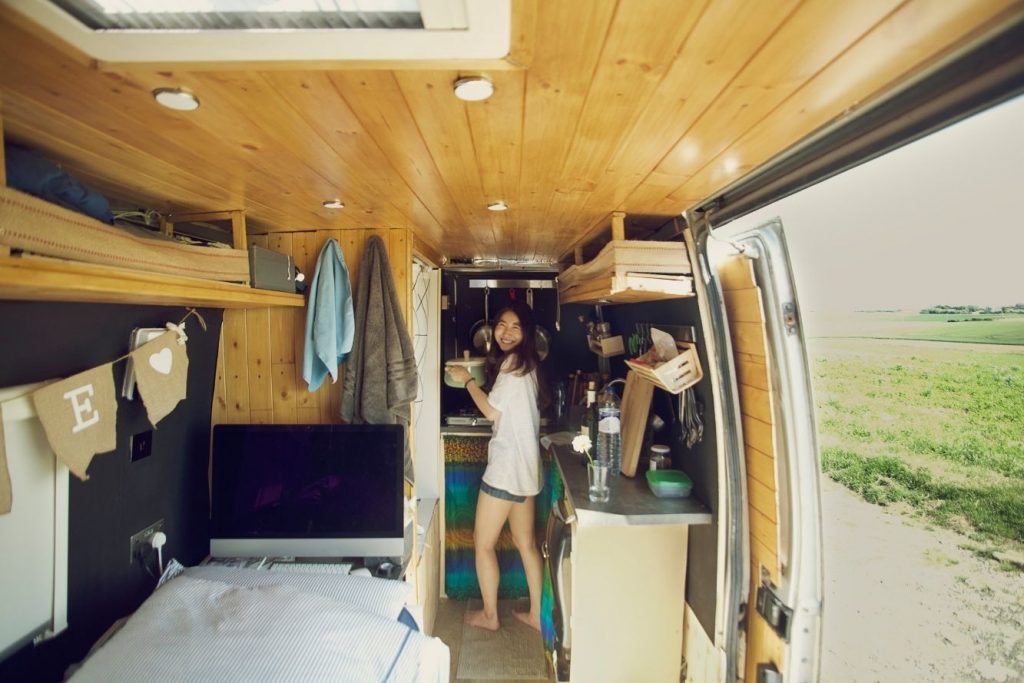
Do-It-Yourself camper van conversions are regular vans that have been converted into camper vans. DIY camper vans can be done by anyone. Or you can choose to purchase a converted van from a conversion company.
Homemade or DIY camper vans are significantly less expensive than Class B RV camper vans. But, they can have just as many (or more) amenities and features added.
Check out these Ford Econoline Camper Van builds for examples of DIY camper vans. DIY van builds are built in many different kinds of vans including cargo vans, passenger vans, and even minivans. There are high-roof and low-roof versions and the possibilities are seemingly endless.
Want to Learn How to Build a DIY Camper Van?
Van Life Academy is an in-depth course that teaches you everything about van life. From selecting the right van for you, planning your build, budgeting, building it, and so much more, it has everything you need to know!
Want to know more about the course? I went through the course myself. Read my Van Life Academy Review here.
Minivan Campers
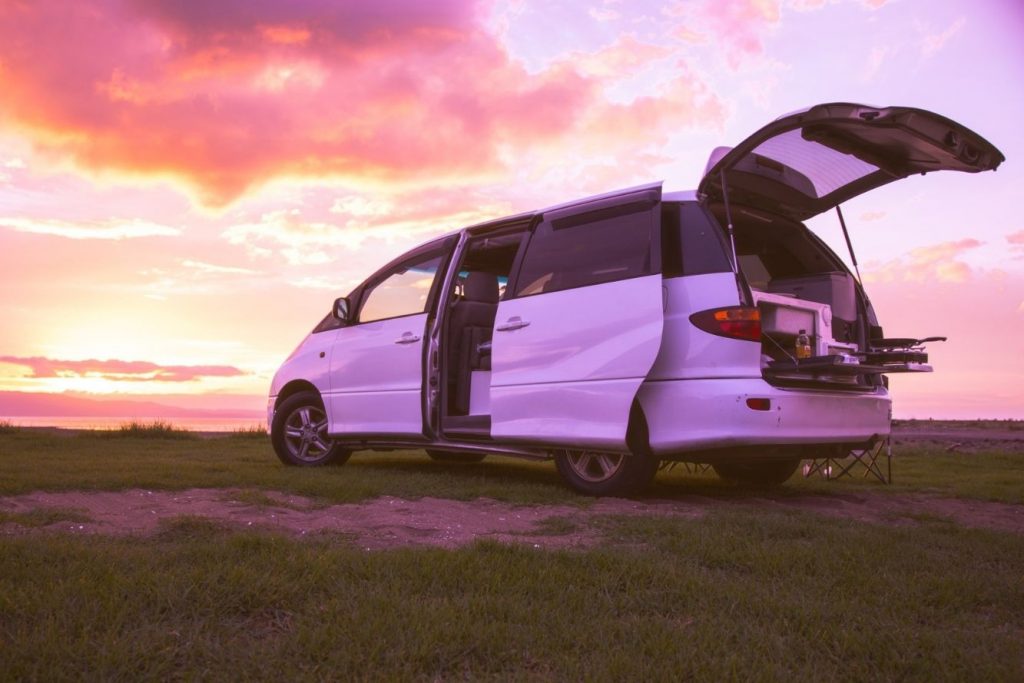
What is a minivan camper? These are campervans built out of a minivan body. Minivan campers are growing in popularity for their versatility and ease of use.
Minivans make excellent camper vans because of their insanely good gas mileage and interior space. These are great campers for solo campers, those on a budget, or van dwellers who want to stealth camp.
How Much Does a Camper Van Cost?
A camper van can cost anywhere from around $5,000 to upwards of $300,000. If that range sounds insane, it’s because it is.
The price of a camper van varies based on several factors. These include: new vs used, year, make, and model, and DIY camper van vs Class B RV.
Class B RV Camper Van Price Range
Class B RVs are the most expensive of all types of camper vans. They are also the most expensive type of RV when you think in terms of price per square footage!
Class B RV camper vans range in price from around $65,000 for the Coachmen Beyond all the way to prices of $300,000 or more!
DIY Van Conversion Price Range
Van conversions that are DIY have a much lower barrier to entry. DIY van conversion prices can range anywhere from just $5,000 (or less) to upwards of $100,000 or more.
A DIY camper van can be as simple as a camper van with an air mattress, cooler, and camping toilet. So, realistically, you can purchase a used cargo or passenger van, throw some camping stuff in it, and call it a “camper van”.
For a more robust camper van setup, you can expect to pay anywhere from $15,000 to $40,000 for the van itself. Then you'll have to pay anywhere from $5,000 to $40,000 for the build-out.
I know it sounds so confusing!
I bought my 2013 Ford Econoline passenger van for $13,000. I’ve spent about $5,000 on all the building materials including solar, a toilet, electrical wiring, a battery, and all the wood and paint and tools for cabinets.
My camper van build is going to be very bare-bones. For a more robust setup I could easily spend $10,000 or more.
Why Are Camper Vans so Expensive?
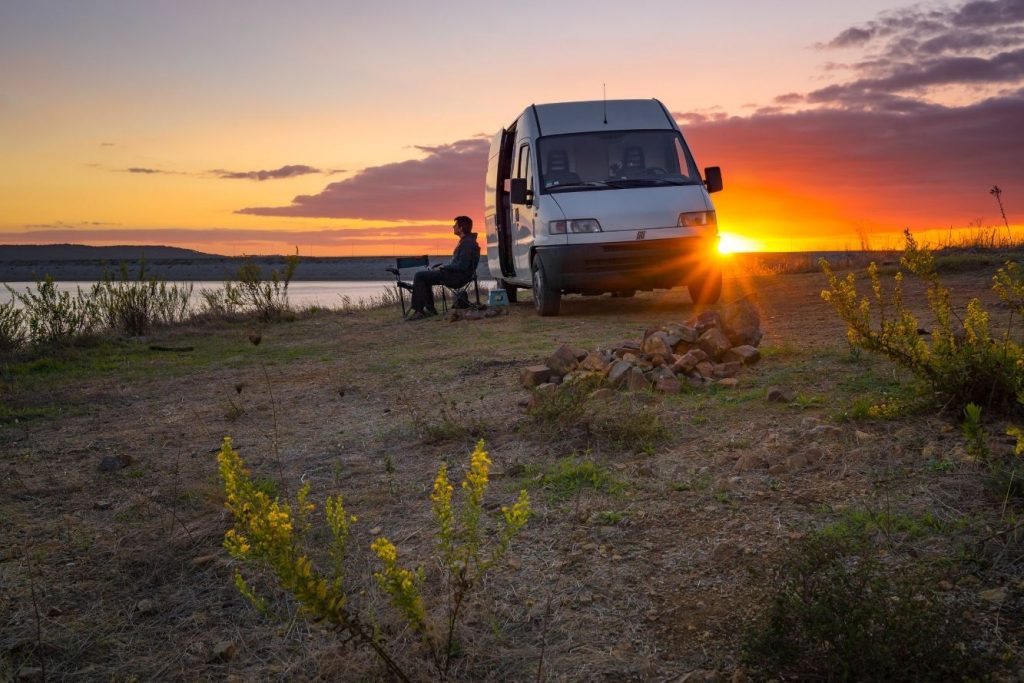
Class B RVs are the most expensive RV per square foot because of the cost of the van itself and the skilled labor that it takes to build with such a small space.
Converted camper vans from van conversion companies charge for the price of the van (which is usually somewhere in the $30,000 to $45,000 range), then they charge for all the building materials and accessories, plus their time for labor. This ends up creating a really expensive end result, too!
The cheapest way to get a camper van is to build it yourself, which is what I have done along with tens (if not hundreds) of thousands of other van lifers.
Do Camper Vans Have Bathrooms? (Toilets and Showers)
Some campervans have toilets and some don’t! It depends on the type of campervan, the size, and the person buying or building it.
Buying a pre-made camper van without a toilet will save you some money on the price of the RV and you can always add a camping toilet later on.
But for some people a toilet (and sometimes shower) is a necessity.
Showers are much less common in a camper van than toilets are. This is because showers require extra fresh water and waste water storage. But you can definitely find them!
Many DIY van builders choose composting toilets or portable camping toilets. For those DIY campervan builds that prefer a shower, there are many options. Some people choose to build a shower into their layout. While others have camper van showers made out of a simple garden sprayer.
Can You Live in a Camper Van?

Yes, you can live in a camper van! Living in a camper van is a popular choice for nomads, those looking to save money on renting or mortgages, and houseless individuals.
Living in a van is an awesome way to travel and see the country. It's also really popular with the minimalist and tiny living crowd.
Is It Legal to Live in a Van?
The legality of living in a van is entirely dependent upon how and where you choose to live in it. Some cities and towns have ordinances against living and sleeping in vehicles. In these areas, you can be fined for living in a vehicle (which is total BS if you ask me). But, in general, living in a van is legal as long as you have all the proper paperwork and licenses.
What Is Van Life and Why Is It So Popular?
Van life is living and/or traveling in camper vans and it has been gaining momentum and popularity over the past few years. The van life and camper van dwelling have been a thing for a long time now.
But movies like Nomadland and the recent Gabby Petito case that sent shockwaves worldwide have propelled this alternative lifestyle to the top of the spotlight.
The Van Life lifestyle is portrayed on social media as a glamorous traveling and minimalist lifestyle, but sometimes it’s anything but.
Living in a van isn’t always beautiful and perfect! This lifestyle is so popular because of the ability to travel, no rent or bills to pay, and the minimalist lifestyle that forces experiences over material items.
Is Van Life Cheaper Than Renting?
Yes, overall I’d say that vanlife is considerably cheaper than renting, especially if you have no van payment.
The only real payments you’re responsible for when you live in a van is the van payment, your car insurance, your phone and/or internet bills, groceries, gas, and any other personal bills that you make payments on.
Let’s say your phone bill is $150/mo, your car insurance is $200 and you spend around $400 on groceries and food and $400 for gas. That’s a total cost of living of just $1,150. If you lived in an apartment or house, you’d have a lower gas budget, but you’d also have rent and utilities.
Van life is much cheaper than renting! Unless you decide to live in RV parks and campgrounds, then you’ll also be paying camping fees.
Popular Camper Van Types
So what are the popular camper van types? Let’s take a look at the most common vans.
Mercedes Sprinter Camper Van
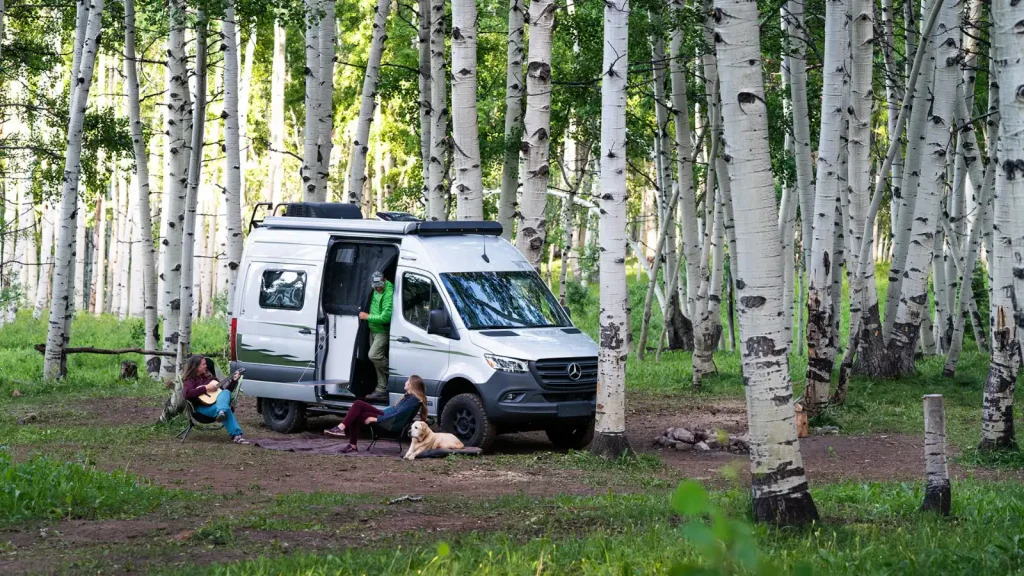
Mercedes Sprinter camper vans are popular and sought after camper vans that come with a price tag you’d expect attached to the name “Mercedes”. Class B RV Mercedes Sprinter camper vans are pretty luxurious, and the chassis itself is popular among DIY van builders too.
Examples of class B RV Sprinters include the Winnebago Revel, Era, and Boldt, the Thor Sanctuary, and many more.
How Much Does a Mercedes Sprinter Camper Van Cost?
Mercedes camper vans start anywhere around $100,000 and can cost upwards of $300,000 for a class B RV.
If you just want the bare Mercedes Sprinter camper van chassis to build your own camper on, you can expect to pay around $40,000 for a new model.
Dodge Promaster Camper Van
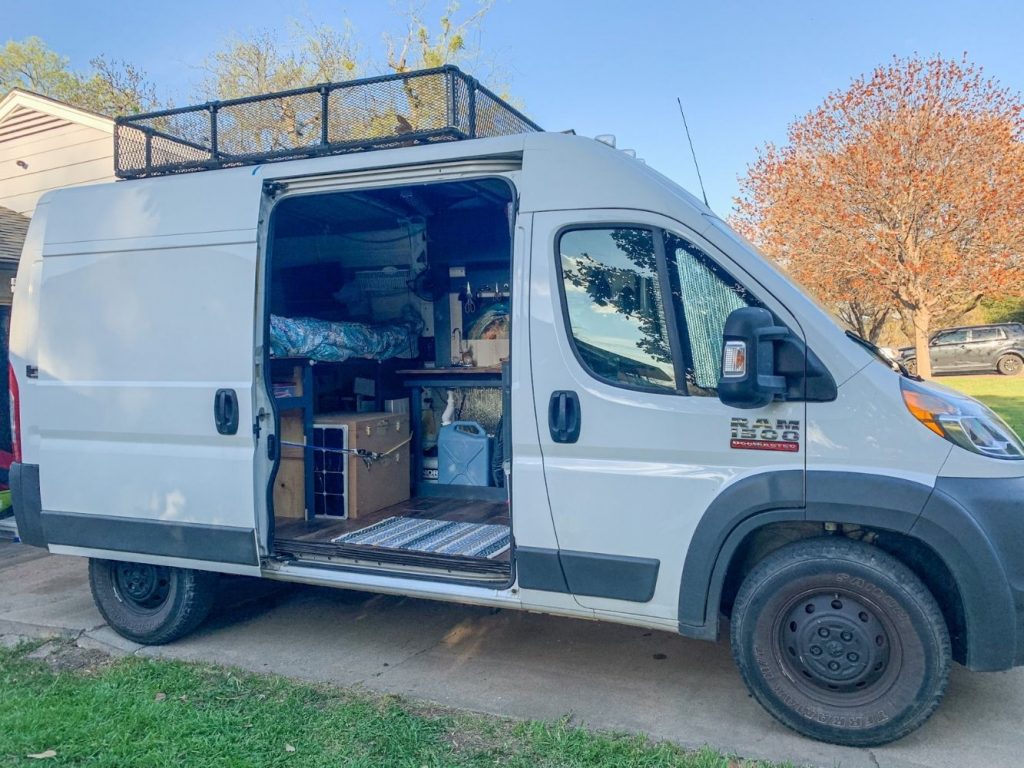
Dodge Promaster camper vans are popular options for camper vans for the reliability of Dodge and the budget-friendliness of the chassis. Class B RVs on the Dodge Ram Promaster chassis include the Winnebago Travato, Solis, and Roam, and the Thor Rize and more.
Promasters are also very popular options for DIY camper van converters who want a capable vehicle that also has standing headroom.
How Much Does a Dodge Camper Van Cost?
As far as class B RVs on a Dodge Ram Promaster chassis, the cheapest that I’ve found is the Thor Rize and it comes in around $76,000 new. Prices for the Promaster Class B RVs can be found in upwards of $200,000!
If you just want a Dodge Promaster chassis to build your own van, you can expect to pay around $30-$35k for a new model.
Ford Transit Camper Van
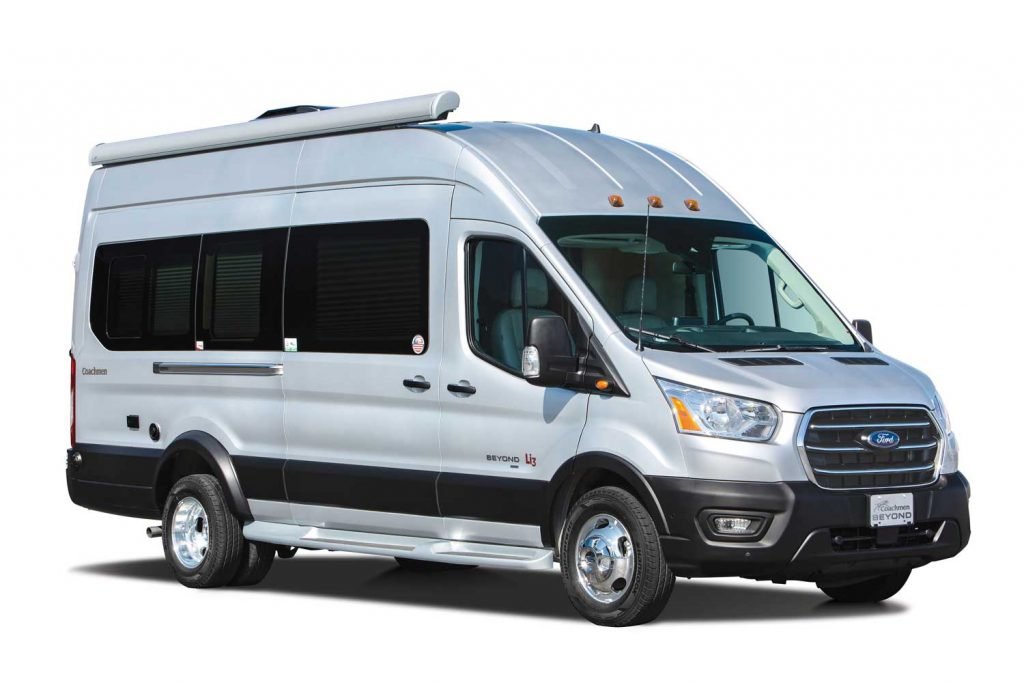
Another popular chassis for camper van conversions and class B RVs is the Ford Transit High Roof van. Although these are less popular with RV manufacturers, these vans are really popular with van conversion companies and DIYers alike.
How Much Does a Ford Transit Camper Van Cost?
Ford Transit van chassis cost around $35,000. The Coachmen Beyond Class B RV is built on a Ford Transit chassis and the price for one of these ranges from $65k new to upwards of $165k depending on the model.
Chevy Astro Van Camper
Chevy Astro van campers are really popular with the DIY van conversion crowd. Although these vans are no longer in production, they have a couple of features that make them really well loved in the vanlife community. First, they’re pretty easy to convert. Second, they have a really cool rear door hatch system that seems so dreamy! The top half of the rear door opens up like a hatch and the bottom half is split into two barn door style doors that open out.
How Much Does an Astro Van Camper Cost?
Since you can only find used Astro vans, you can expect to pay less than $10,000 for one of these vans. Most used Chevy Astro vans that I’ve found are in the $4,000 range.
Ford Econoline Camper Van
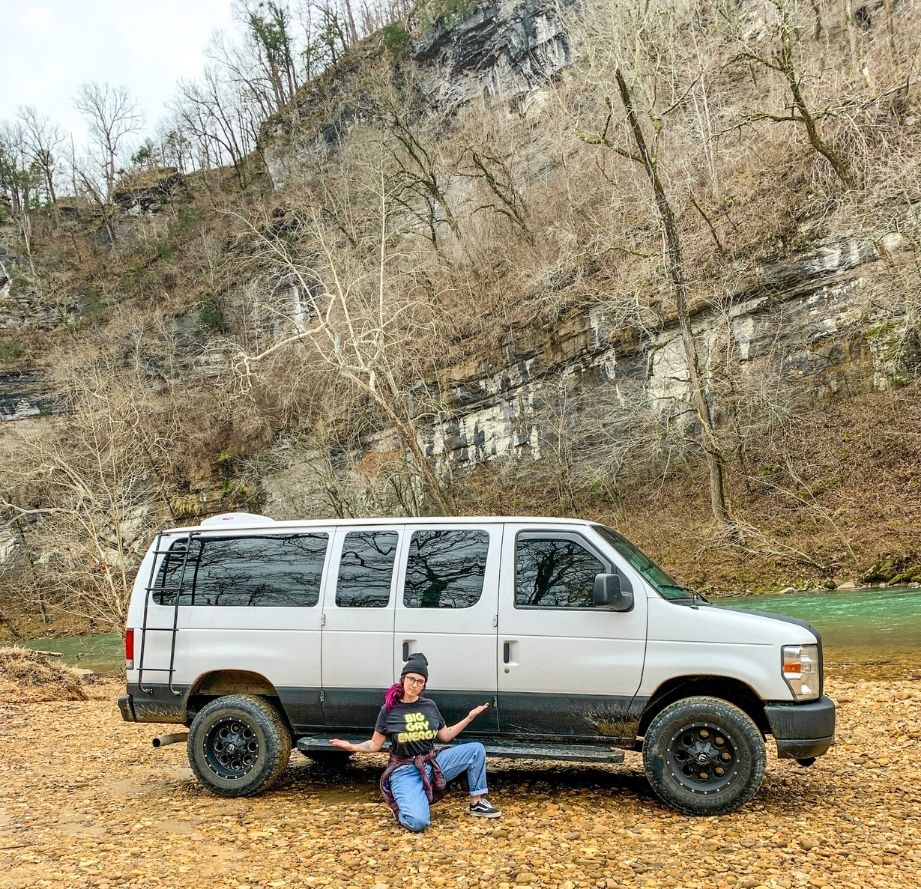
Ford Econolines are another popular low roof van option for campervan conversions. My van is a 2013 Ford Econoline Super Duty 3500 passenger van. It’s a low roof, but I love it!
The Ford E-series vans are great for building a camper van, both the old vans and new ones alike.
How Much Does a Ford Econoline Camper Van Cost?
Ford Econoline vans can cost anywhere from $10,000 or less (used) to upwards of $20k new.
Minivan Campers
Another popular van type for a camper van conversion is a minivan. Minivan campers make excellent camper vans because they have a lot of room compared to other vehicles and they have incredible gas mileage. They’re also really great for people who don’t want anyone to know they’re camping or living in a van – most people wouldn’t suspect that from a minivan!
How Much Does it Cost to Convert a Van into a Camper?
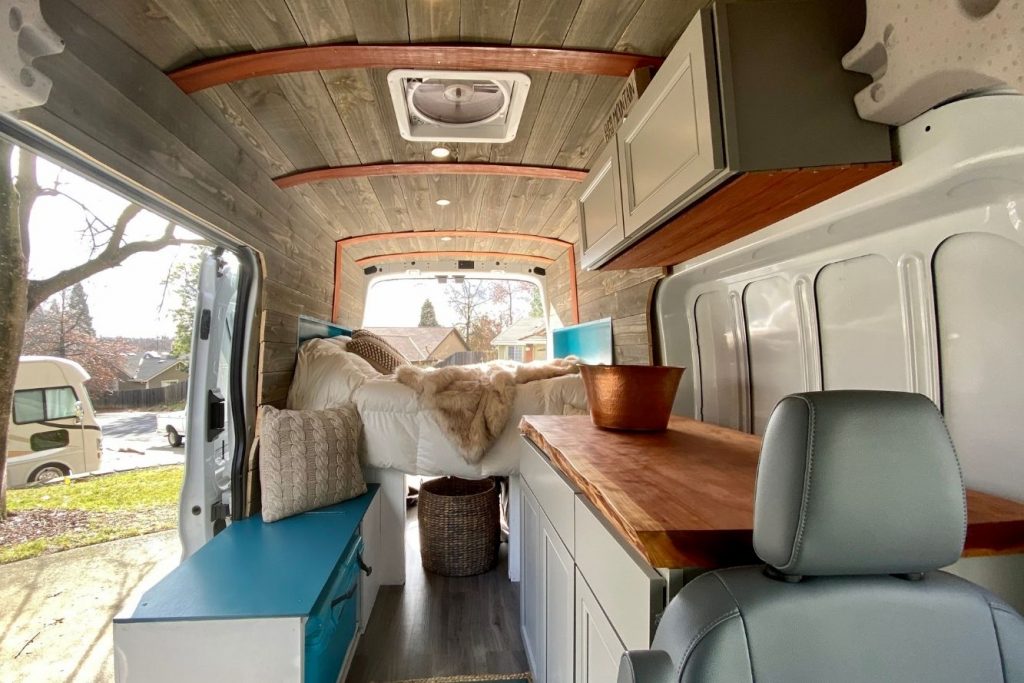
You might be surprised to hear that it can cost as little as under $1,000 to upwards of $30,000 to convert your own van into a camper. The price truly varies a lot!
Depending on how complicated you want your build to be, you really can do it on a budget. If you don’t have a lot of money to spend, you need to think about your essentials.
For me, my essentials include a toilet, a bed, a cooking area, a heater, a fridge, and a small power system to charge my laptop, phone, and cell signal booster. The total price of my build so far is about $5,000. I gutted my passenger van, added insulation and walls, lights, and build everything from scratch.
Some people are just fine with a bed and a couple ready-made drawers from the store, and in that case your “camper van” could easily cost just $200 or less.
Others who want to really build out their van to look and perform like an RV can expect to pay between $10k and $30k for supplies, appliances, and any labor they might need help with.
Low Roof Vans vs High Roof Camper Vans
If you buy a camper van that’s manufactured and sold as a Class B RV, you will end up with a high roof vans. But there are camper vans in low roof vans like the Chevy Astro and Ford Econoline, too!
Custom van conversion companies and DIYers alike choose low roof camper vans for a variety of reasons. My camper van is a low roof Ford Econoline 3500, and the primary reason I chose the low roof version is because you get a lot more van at a much lower price. In retrospect, I wish I would have saved up for longer and got a high-roof van, but there are tons of things I love about my low-roof Econoline.
Can You Get a High Roof Put on a Camper Van?
There aren’t many options that exist for adding a high roof to a low roof van. The options that do exist are crazy expensive unless you decide to DIY it. If you DIY it, you should have a lot of knowledge and expertise and an ample work area.
You can get a custom fiberglass topper for your van from Fiberine, but you have to travel to LA and leave your van with them for the installation. Prices for Fiberine van tops will run upwards of $6,000.
Some people scour junkyards and buy the topper off of a defunct van of the same brand, type, and dimensions, and some opt to have a pop top put on. There are many forums online discussing this dilemma.
Personally, I wanted to have a topper from Fiberine added to my van, but I couldn’t justify the price – it would have cost me about half of what I paid for the van itself. I hope in the future we will see more affordable options for fiberglass high roof van toppers.
Can You Park a Camper Van Anywhere?

Yes, you can park a camper van anywhere that it’s legal to park a regular vehicle. Now, can you sleep in a camper van anywhere? Not really, but we covered that in an earlier section.
Most camper vans aren’t much longer than a regular vehicle or truck and they are really easy to drive and super convenient to park in any regular parking spot, including those in busy downtown areas. You can parallel park a camper van and that’s one major benefit of having one of these small campers.
Can You Rent a Camper Van? How Much Does it Cost to Rent One?
There are many camper van rental companies available from actual rental companies to camper van conversion companies and peer to peer rental services like Outdoorsy and RV Share. The cost to rent a camper van can range from between $50 per day to over $200 per night.
Do Camper Vans Need RV Hookups?
Some camper vans can use RV hookups, but they’re not required. Most camper vans are fully self-sufficient, including DIY camper vans. Most new camper vans being manufactured today come standard with batteries and solar power options or add ons.
If your camper van has an air conditioner or high-powered appliances, you will likely need to plug in to a power pedestal to power the appliances.
Similarly, if your camper van has a gray or black water system other than a cassette toilet or removable jugs, you will need to dump your waste water in approved RV dump stations.
Are Campervans Off-Grid Capable?
Most camper vans built today are off-grid capable. Not all camper vans are great for off-roading and some are still made for the RV park and campground lifestyle. But for the most part, manufacturers are in touch with the needs and desires of the market, and many camper vans are ready for boondocking and camping off the grid.
As far as DIY camper vans, a bare bones solar power setup and portable camping toilet is really all you need to go off the grid! When I was building my camper van, having a toilet and solar power setup was crucial for me because of how I like to travel.
Is a Camper Van Worth It?
Only you can decide if a camper van is worth it for you. Do you want a versatile and capable camping vehicle that has everything you need, yet can fit into a small parking spot? If so then a camper van should be right up your alley!

Carrie Wilder
Carrie has a passion for location independence and nomadic lifestyles. After traveling full-time in an RV and living the van life, she created Making Money and Traveling to help others make the switch to a remote lifestyle. Learn more about Carrie on the About page or connect on social media below.
Download this FREE ebook learn 60+ ways to earn an income from anywhere!